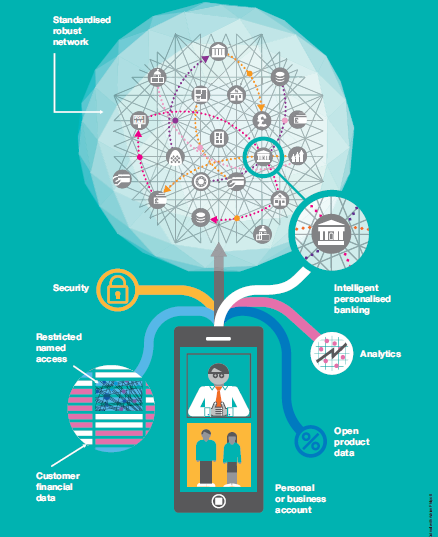 Open Banking: Open Energy – a way forward for opening up energy data and innovation?
Open Banking: Open Energy – a way forward for opening up energy data and innovation?
Catherine Mitchell, IGov Team, 2nd August 2017
This past week has seen the welcome release of the BEIS / Ofgem Upgrading Our Energy System – Smart Systems and Flexibility Plan.
Moving to a vibrant, flexible, efficient energy system will require a far deeper, more granular knowledge about GB energy flows. Conventional energy companies – some of which currently have access to data, for example, network companies and suppliers – are trying to work out how they can use ‘their’ data to enable themselves to transform their business models from the ‘old’ to ‘new’ energy system. Various non-conventional energy companies of various sizes are trying to work out how they can access a viable ‘route to market’ so that they can be part of the smart, flexible energy system – and to do that they need to both: (1) access ‘data’ to work out what potential there is for a service, and what its value might be to a customer (system, individual business, local authority, etc) and (2) have the ability to capture the ‘value’ of the service they are trying to provide.
At the moment, individual data is in the hands of the customer – who can currently give permission to hand over that data to an individual entity (ie to one company at a time) and suppliers (who provide the service to the customer); and system data is in the hands of the distribution network companies and transmission system operator. The ‘value’ (ie means to access payment for something) in the conventional energy system in GB continues primarily to be for the functions of the ‘old’ energy system rather than for the ‘new’ flexible energy system – as IGov blogs have written about time and time again.
Together this means that:
- Large suppliers (with access to millions of customers) and network system operators can make alliances with anyone to use their data. In particular, they can also potentially make alliances to bring their different data together, thereby presumably helping themselves maintain their positions in this very uncertain energy world;
- Data on the whole is very difficult to get hold of for new entrants or new services; and
- Even if a company – of whatever type or size – can get hold of sufficient information, it is hard to access value for any new service that information may enable. Accessing a sufficient level of value (ie making enough money to allow a venture to go forward) is even harder for new entrant company / non-profits etc.
IGov therefore sees (1) the open access to data and (2) the valuing of new energy and system services, such as flexibility, and the ability to capture that value as fundamental requirements of the move to a flexible, smart, efficient energy system. Given neither are in place at the moment, the successful implementation of the smart system plan appears ‘challenging’! However, it seems to IGov there is a reasonably straight forward solution – taken from examples already occurring either in GB or elsewhere in the world:
- As IGov has argued before, Ofgem the Regulator should – as part of the regulated settlement – require the DNOs to undertake a transparent distributed energy resource assessment, involving all potential or possible stakeholders for those resources – as is underway in several States in the USA. Ofgem the Regulator / BEIS should then undertake a rigorous analysis of value of DER to the system, and the governance implications to capture that value.
- BEIS / Ofgem / Stakeholders should also explore a parallel Open Energy exercise as has occurred in GB Banking, including the Open Banking Implementation Entity (OBIE) / Open Energy Implementation Entity (OEIE (?)) – with lessons learnt of course. This would open up both customer and system data.
- BEIS / Ofgem should take steps to establish an energy Data Body, as occurs in Denmark, and as we have argued elsewhere – this might be part of the Open Energy exercise / an Open Energy Implementation Entity. The final result, at the end of the day, should be an open access energy data repository in GB to enable energy innovation to occur.
Lessons from the Banking Industry
The GB banking sector is currently in the process of opening up data to enable easier customer involvement with banking products, but also to enable new products to be offered more easily to customers. This process is known as Open Banking. At root, this sets up a means for (all) customers to access all banking products but it also sets up a means for customers to make their information – and they can choose to what level – available to anyone, securely, rather than to individual entities (as is the case in energy at the moment). This allows actors (including new entrants) to search for customers which might suit their new service, and vice versa.
Within the energy system, an analogous opening up of energy data could be (1) the energy flows on networks by time of day and place; and (2) customer energy use – by individual customer, by substation etc. IGov takes the view that transparent data is the key to innovation. For example, domestic aggregation has so far failed to take off in GB – in large part because of problems of access to data and value. An Open Energy Standard would provide one half of the necessary requirements to make that happen. The other half is setting up a governance framework which enables value to be captured.
The Open Banking Standard offers a methodology for how this could be undertaken, with lessons to be learned, for the energy sector.
Banking and Energy are obviously different. But for energy to transform to a flexible, secure and efficient system – data of those energy flows have to be made available. As the picture below (taken from the Summary report of the Open Banking Standard) shows there are also multiple similarities between the two sectors. Open Energy needs to be explored further.
Related Posts
« Previous Viewpoint: Bad news, buried: Capacity Market de-rating factors for storage Presentation: Advisory Group Insights Next »








